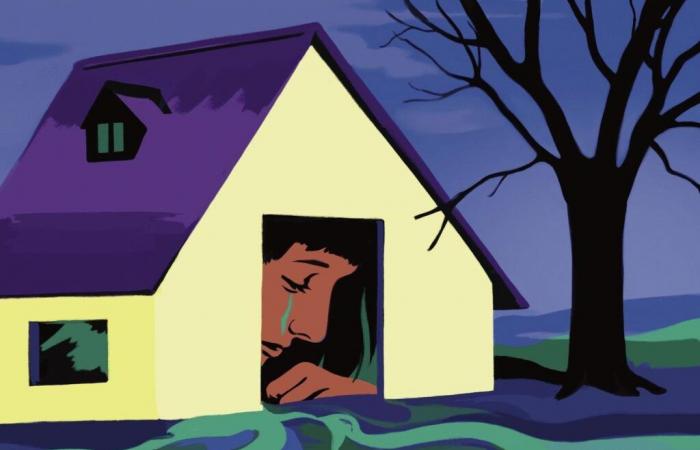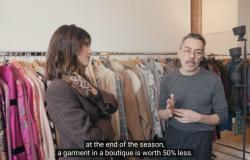I grew up in an old house near Rouen, in Normandy. My parents bought it together when I was born. When my mother died, I inherited part of the property. I was 5 years old. When I entered sixth grade, Dad became ill with cancer. The question of inheritance has always arisen for me. We sometimes talked about it during family vacations. I was angry. I didn’t understand why people were talking about my father’s death before he passed away. Maybe inheritance is a question you ask yourself when you are 40 years old, have a house and two children. But I was 13, and I didn’t want to think about it.
“My inheritance was the €1,000 that my father paid me the day before his death”
I was very attached to my childhood home. I loved my attic room, right next to my father’s painting studio. It was a place a little cut off from the rest of the house, we had to climb an old wooden ladder to access it. Dad loved writing and had been painting since he was 20. He had accumulated lots of paintings, brushes and pencils which were piled up under the beams of the leaning roof. It was our own place, no one else went there. When my father remarried, he hung my mother’s photos and memorabilia up there. My mother, my guardian angel. I used to go up and write letters to him when I was little. It was the place where I could think of her. And when my father died, that’s also where I went to find him.
Dad died the day I learned that I was accepted to Sciences Po. I needed money for my studies, but I didn’t want to sell the house. I wanted my mother-in-law to be able to stay and live there to grieve. My inheritance was the €1,000 that my father had paid me the day before his death. That was all he had left in his account. I absolutely needed a scholarship to be able to study in Paris, it was my only option. I fought for five months before getting it. The administration did not understand that I could be a minor and an orphan, I was constantly asked about my parents’ income! I was furious that no one was doing anything to help me.
“I was alone with myself to manage my dual license, the inheritance and the financial difficulties”
At 17, I had to take care of my father’s estate alone. Suddenly, I became the point of contact. I had to decide everything. The appointments with the notary for the house, at the bank to close his account, the request for emancipation from the family affairs judge… I was alone in front of myself to manage my dual license, the inheritance and financial troubles. Every day I had to do something or call someone. I burned out, I just wanted it to end. And I didn’t tell anyone about what I was going through. Who could I have talked to about it? I didn’t tell any of my friends that I was inheriting, not even my boyfriend at the time. And I’m not sure they thought about that. You don’t think about that at 17.
Two years after my father died, my stepmother told me she wanted to leave home. It was a slightly damp building from the 1960s, the wind had torn a few slates from the mossy roof. We would have had to do a lot of work to keep it, it was a financial burden for us. However, I had no desire to sell it. All my memories with my parents, I experienced them here, in the large garden and the painting studio. But it had to be resolved. At that moment, it was like losing my parents a second time.
“I had to sort through eighteen years of existence, I could barely keep anything”
I spent two months emptying the house. And all the pain that I had managed to relegate to a corner of my head came back suddenly. I had to sort through eighteen years of existence, I could barely keep anything. How could I have? I had no apartment, no car, and I was going to London to study at the end of the summer. If I had inherited it at 40, I could have chosen to keep more things: the table that my father made, the large black leather sofa that we had forever, my toys from when I was little… I even had to give away a lot of my mother’s clothes that my father had kept for me. I still kept a few, including a pink sweater that I wear during important moments.
That summer, I said goodbye to the paint studio. But when I left, I took a few pieces with me: my mother’s diary, my father’s hat, the book he wrote for me for my 18th birthday… Dad’s best friend offered to make a little space at home for me to keep the books from the library. This library was my father’s wealth. He made me read all the Arsène Lupins, The Myth of Sisyphusby Camus, and his favorite book, Little Fadette by George Sand. He reread it dozens of times, to the point of damaging the pages, which had yellowed with time. It would have broken my heart to part with it. At the end of the summer, the house was sold and I said goodbye to Rouen and my previous life.
“My heritage is the only safety net I have left”
Since then, I have avoided coming back to this city. It reminds me that I no longer have a home. At 20, we like to go home to our parents to recharge our batteries. We also like to tell ourselves that, whatever happens, we will be able to find refuge with them. I have nowhere to go back to. My heritage is the only safety net I have left. I need this money. But receiving it, I experienced it as a failure. I had no desire to inherit. My family asked me what I was going to do with it. I chose not to touch it. In case. I postpone the problem until later. I feel a little guilty about inheriting at 21. I live off the grants, but I probably have more savings than my friends. It’s an uncomfortable place to be…I’m experiencing a phase in my life where I’m not supposed to be. So I act as if this money doesn’t exist. For now. I had to grow up quite quickly, I wanted to live a normal student life. And you don’t talk about your heritage over coffee with your friends.






